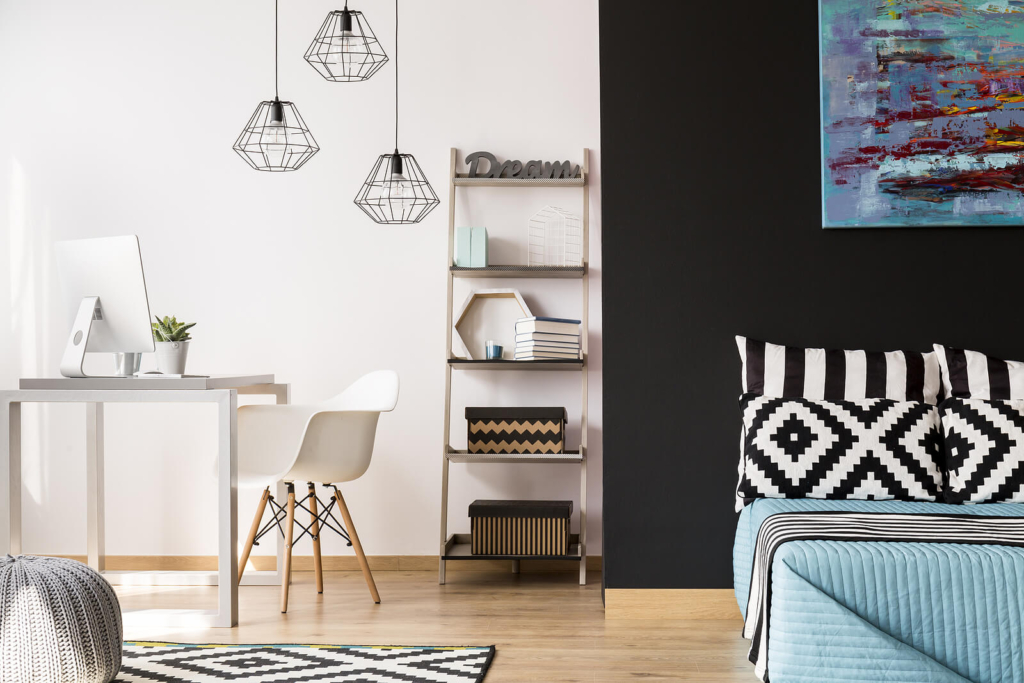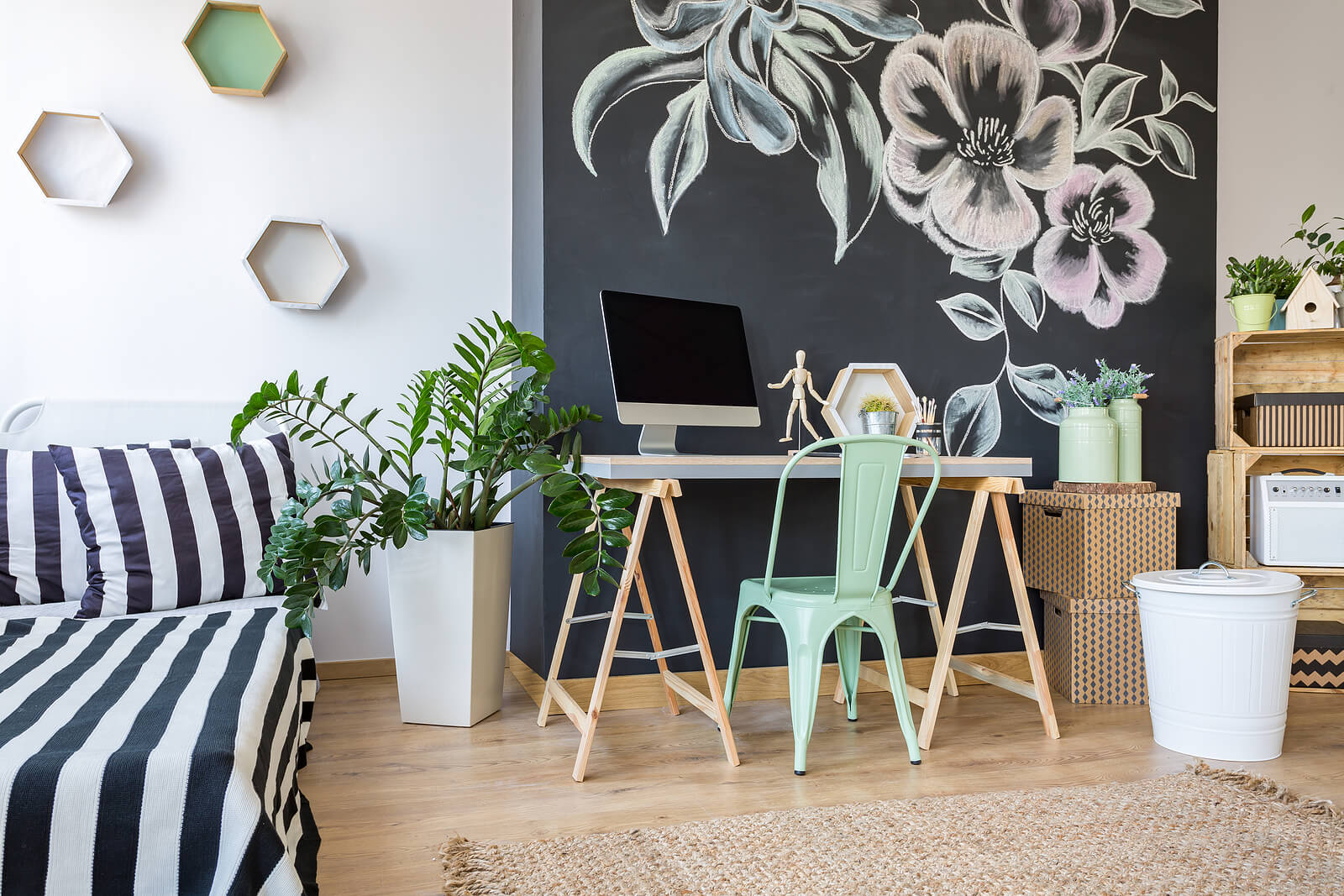Our furnished student accommodation prioritises your academic success. Each bedroom features a dedicated desk and serves as your personal sanctuary, setting you on the path to an optimal study space.
A well-designed study area can significantly amplify your learning potential and positively impact your university achievements.
Ditch the books for ten minutes (we know you won’t need to be asked twice!) while you learn how to create a study space tailored to your needs.
Whether you’re looking to elevate an existing setup or start from scratch, we’ll explore various strategies to create a captivating and efficient study area in your bedroom.
Prioritise comfort
Achieving an effective study area in your bedroom hinges greatly on prioritising comfort. Without it, the likelihood of avoiding or underusing the space significantly increases.
If you’re renting an unfurnished property, you might be missing two essential study assets in your bedroom: a desk and a desk chair. If so, buying these is your first step to creating a study area where you want to sit.
If you already have a desk, assess it. Is it ergonomically suitable for your needs? Experimenting with chair and monitor heights and perhaps using a laptop stand can help you find the ideal position for a study session that doesn’t strain your back and neck.
In furnished properties where a desk chair is provided, it’s essential to test its comfort. A lumbar support pillow can enhance lower-back support and make sitting for long study periods more comfortable.
Prioritise options with built-in support. Whenever possible, visit a store to physically test chairs rather than relying on an online purchase. Trying it first can make a significant difference in selecting the right chair for your body and study space.
Keep it tidy
Maintaining a clean and organised study space is a small yet impactful action that significantly enhances appeal. A cluttered desk and chair filled with used cups, shopping bags, and yesterday’s clothing never invites productivity.
The key to a tidy desk is to avoid turning it into a catch-all spot. Either stow items away when not in use or designate another area in your room for temporary storage, ensuring it’s far away from your desk.
After each study session, make it a habit to organise your books and papers. This simple act keeps your space neat and sets a welcoming stage for your next session.
Don’t overlook the importance of regular bin emptying — maintaining a clean environment extends beyond the desk’s surface and contributes to a more inviting study space.
Light the way to success
The significance of lighting in your study environment can’t be overstated, as it profoundly influences your studying efficiency.
Aim to maximise natural light without direct sunlight exposure. Open your curtains wide and strategically position your desk to harness the most natural light.
When natural light isn’t available, artificial lighting becomes essential. However, finding the right balance is vital.
Avoid overly bright lights, which can cause overstimulation. You should also steer clear of dim settings that might strain your eyes as you dive into your textbooks and notes.

Reduce noise
Your headphones might be a constant companion, but choosing what to listen to while studying deserves thoughtful consideration.
People thrive under various auditory conditions — some prefer silence, while others benefit from consistent background noise. Research indicates that specific sounds aid focus and enhance study sessions for many individuals.
Discover what works best for your productivity by dedicating time to test each sound type for at least 10 minutes.
Explore options like white noise (a blend of all frequencies akin to aeroplane ambience), pink noise (resembling rain or waves), or the even closer approximation, brown noise. Additionally, grey noise — a blend of white and pink noise — emits a soothing hissing and rumbling.
Consider experimenting with nature sounds — rain, waves, wind, birds, or waterfalls — for a more natural and stress-reducing auditory experience.
For those inclined towards music while they read and write, instrumental tracks with minimal or no lyrics can be conducive to concentration. There are plenty of Lofi live streams on YouTube dedicated to studying that can get you into the zone without distracting lyrics.
If you require silence, noise-cancelling headphones prove invaluable, especially in shared living environments with noisy housemates.
Keep distractions at bay
Identify the distractions that hinder your productivity and take proactive measures to eliminate them from your study space.
If your tendency to frequently reach for your mobile phone disrupts your focus, consider leaving it in another room on silent mode while you revise or write. To safeguard against unwanted interference, set a password to prevent cheeky housemates from accessing or tampering with your phone.
Investing in a small clock can help you stay on schedule without relying on your phone or a computer for timekeeping purposes.
While working with music might be enjoyable, consider transitioning to instrumental tracks or turning off the music if it detracts from your concentration.
It also helps to communicate your study schedule with your housemates in advance — perhaps encouraging them to also dedicate that time to their own revision or assignments.
Maintain a pleasant temperature
Your study space might feel chilly if you’re not living in a bills-inclusive student house and aim to save money on heating during the colder months.
Consider purchasing a cosy blanket to drape over yourself while studying. It will keep you warm and comfortable at your desk, and you can also use it on top of your duvet at night for extra warmth.
Maximise airflow by opening windows when it’s warm. If your study area becomes too warm, using fans can help maintain a comfortable temperature.
Have nutritious snacks available
During longer study sessions, it’s natural to feel peckish as your brain works hard.
Keep yourself fuelled and focused by having nutritious snacks readily available at your desk — having them nearby means you won’t need to break your concentration to head to the kitchen. Choose from brain-boosting options like nuts, seeds, dried fruit, edamame beans, and popcorn.
These snacks satisfy your cravings and support your memory and focus, helping you stay engaged while completing your work.
Personalise the space
Creating a personalised study area by surrounding yourself with carefully chosen items can transform your desk into a place of inspiration and motivation.
Adorn your workspace with cherished photos of family and friends to add a splash of colour and personality. These snapshots can serve as a comforting reminder of the people who matter most to you and infuse your study area with warmth and positivity.
Additionally, introducing a well-cared-for potted plant can bring nature indoors.



